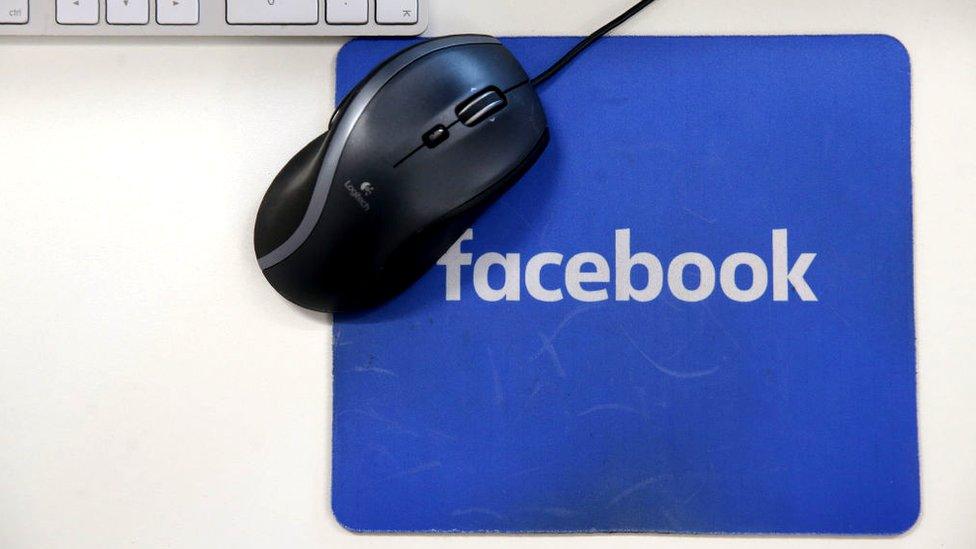Cambridge Analytica: Can targeted online ads really change a voter's behaviour?
- Published

Prof Carroll was not happy with the invasive nature of the data collected on him
Prof David Carroll campaigned for Barack Obama during his presidential bid but did not do the same for Hillary Clinton.
Now he asks himself whether so-called dark ads - individually targeted online messages - were to blame.
"I am open to the possibility," he told the BBC.
"I am concerned I got ads or stories with falsified information about Clinton that may have discouraged me from volunteering for her campaign. I volunteered for Obama so why did I not do it again?"
He is one of the 240 million Americans which controversial political campaigning firm Cambridge Analytica claims to have built a detailed profile on. Such profiles are said to include what car a person owns, their health concerns and what media they consume.
That information when combined with pyschographics - micro-targeting personality types with messaging that plays on their fears or concerns - could be a powerful tool in persuading people which way to vote.
The firm, which was employed by President Trump's election campaign, is currently mired in controversy over how it acquired and used the Facebook data of 50 million Americans.
At the start of the year, Prof Carroll requested that Cambridge Analytica provide details on the personal information it had collected on him.
What he received was both worrying and intriguing.
It included rankings on 10 issues - giving him a three out of 10 on gun rights, and seven out of 10 on national security importance, alongside the suggestion that he was unlikely to vote Republican.
"It seemed so invasive. This was about predicting my behaviour without my knowledge or consent," he told the BBC.
But it was also confusing. The data was unclear - was the three out of 10 a good or bad thing? Did gun rights mean more or less gun control? And it also seemed rather brief.
"The chief executive of Cambridge Analytica had boasted that the firm had 4,000 to 5,000 data points on most US voters but what they gave me was a dozen at most," he said.
He felt that the company was withholding information, which gave him grounds to mount a legal challenge in London's High Court.
Cambridge Analytica has until April 5 to respond. So far, it has not done so but does claim to have deleted all data gathered from Facebook as soon as it was made aware by the social network that using the information violated its policies.
It has also said that none of the information was used in its work for the Trump campaign.
Data science
Prof Carroll's legal action was filed last week, several hours before Facebook announced that it had banned Cambridge Analytica from its platform.
He does not take credit for the storm that has since ensued but he does hope that the legal challenge will provide the first complete dossier of evidence showing the extent and nature of the profiles Cambridge Analytica claims to have made on the majority of American voters.

Can understanding personality help persuade people to vote a certain way?
The investigation into Cambridge Analytica and Facebook may have profound effects not only on how data is collected in future but also on the very fabric of democracy.
Political strategists are increasingly using social media as a platform for influencing voters and turning to data scientists to crunch information to find innovative ways to target people.
The Conservative Party reportedly spent £1.2m on digital advertising during the 2015 general election, according to the Electoral Commission. Labour spent £160,000 and the Liberal Democrats £22,245. Virtually all of this money went into advertising on Facebook.
The Trump campaign is believed to have spent tens of millions of dollars on digital advertising tailored to individuals.
Building psychographic profiles of individual voters based on their lifestyles and preferences could be hugely powerful, thinks Chris Sumner, research director at the Online Privacy Foundation.
"It is a huge problem," he told the BBC.
"The power of emotional advertising is well-known and drives a lot of decisions but right now there is less regulation on online political campaigns than on a marketing campaign for toothpaste."
His group replicated the methods of psychographic profiling over two years, firstly examining differences in personality traits, thinking styles and cognitive biases between voters in the UK's 2016 EU referendum and then devising their own campaign to test whether it might be possible to identify, target and influence voters.

If you know people's fears, can you play on them to target messages?
It targeted certain messages at specific personalities - for instance, using the language of fear to target neurotic personalities and a more ebullient message from those identified as motivated by anger.
"We found that people behaved as we predicted they would. If you get the messages right they can be very powerful indeed.
"Messaging works and is really effective - and can nudge people one way or the other."
Seth Alexander Thevoz, a political historian from Oxford University, is not convinced that the UK's political parties are currently using such sophisticated methods.
He created a tool dubbed Who Targets Me that allowed users to track online political advertising sent to them during the 2017 general election.
The Chrome browser plug-in, external was downloaded by around 8,000 UK citizens.
Since the tool became available, Facebook has altered its rules, forcing political campaigners to explain their affiliation and Mr Thevoz thinks further changes are bound to follow.
"There will be far more rules and greater regulation - that is the shape that things will take."
But the data collected from the project suggested that the online campaign was far from polished.
"We found that political ads aren't that accurate," he told the BBC.
He explained that ads intended to target people in specific geographical areas were sent to people living in a completely different part of the country.
"The things that Cambridge Analytica claims to be able to do, we haven't seen that slick an operation in the UK. At least not yet." he said.
- Published22 March 2018
- Published21 March 2018
